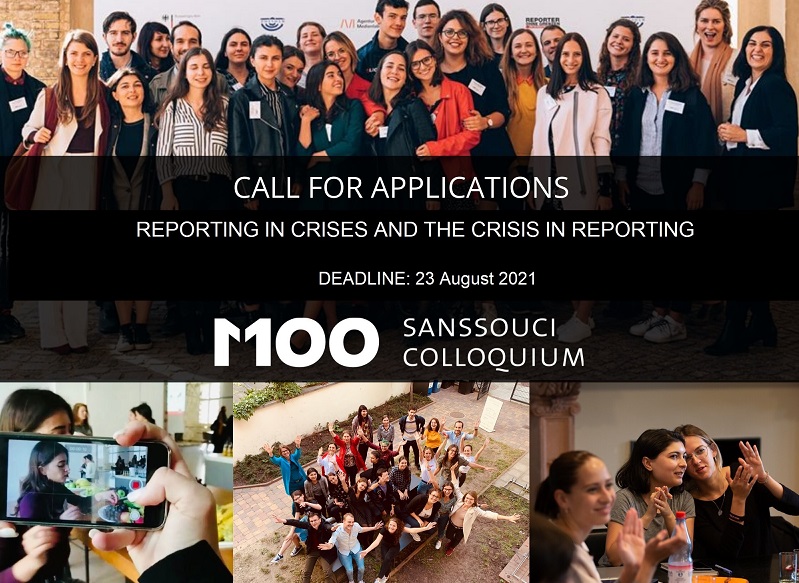
M100 Young European Journalists Workshop 2021
Reporting in Crises and the Crisis in Reporting
Deadline: 23 August 2021
Three online moduls between 10th September and 2nd October, 2021
In times of crisis, it is especially important that people are informed factually and comprehensively by the media; events need to be explained, meaningfully contextualized, and, ultimately, evaluated. The uncertainty caused by crises and the reality of an increasingly confusing world, only serves to increase the need for orientation and information.
We have seen media consumption increase rapidly during the Covid-crisis – and not only in Germany – both in terms of access and subscription figures for digital offerings, as well as in high ratings for news and special broadcasts on TV and radio. Media contributions are shared particularly frequently on social platforms.
However, the crises of recent years have also highlighted the weaknesses of the media system and the resulting problems in reporting.
According to Markus Spillmann, former editor-in-chief of the Neue Zürcher Zeitung, this crisis has hit the media particularly hard, “Much like Covid-19, where people with pre-existing conditions are more at risk than healthy people, it’s the same with the media and publishing houses. Those who were already ailing before the crisis are now in intensive care.”
Crises are increasingly proving to be a stress test for journalists and editorial teams. Both seem to be less and less equipped in dealing with these new circumstances – with far-reaching consequences for society, politics and democracy. With the paradoxical result that while trust in the media is rising in countries such as Germany, at the same time a growing number of people are dissatisfied with reporting. In addition, hostility toward the media and violent attacks on media representatives are on the rise, and there is also a growing tendency for governments of all stripes to exploit crises in order to curtail freedom of the press and freedom of expression.
Comparing journalistic output and challenges facing media organizations across different countries, the goal of this this year’s M100 Young Professionals Seminar is twofold: First, to investigate the root causes of these developments and, second, to suggest possible remedies. In practice-oriented workshops, participants will discuss how the media, in general, and journalists, in particular, can provide orientation in an era of seemingly perpetual crisis. Special emphasis will be placed on strategies and concrete tools available to media-makers for a future-oriented, credible and resilient journalism that is responsive to its audiences.
Conditions of participation:
Young journalists between 18 and 26 years old from all over Europe (including non-EU countries) are required to write a short essay in English (5,000 letters maximum) on journalism and Covid-19 in their country. (For this, applicants are free to focus on either (discussions about) the media coverage of the pandemic or the impact of the latter on journalism at large.)
Please include a short CV and send your application in one PDF (not larger than 2 MB) by 23 August, 2021 to Ms Sabine Sasse, application(at)m100potsdam.org. We can only consider complete applications. Participation is free. The workshop will be held in English.
The seminar will take place online between 10th September and 2nd October in three modules. Regular and active participation throughout all modules of the seminar is required in order to ensure the quality of results. The participation of guest observers on single days is allowed on request.
Timetable:
Module I: Starting the Journey: Outlining common challenges and common goals
Friday, 10 Sept 2021 (14:00 – 17:00 MEZ) – Saturday, 11 Sept 2021 (10:00 – 15:00 MEZ)
Module II: How do we get there? An agenda for resilience in journalism
Friday, 17 Sept 2021 (10:00 – 15:00 MEZ) – Saturday, 18 Sept 2021 (10:00 – 15:00 MEZ)
Module III: And now? Transferring our knowledge & “Masterpiece”
Friday, 1 October 2021 (10:00 – 15:00 MEZ) – Saturday, 2 October 2021 (10:00 – 15:00 MEZ)
Participants can attend the M100 Sanssouci Colloquium, which will be held online on October 6 on the topic “From crisis in perpetuity to democratic resilience”.
The M100 Young European Journalists Workshop
The M100 Young European Journalists Workshop is part of the renowned annual international media conference M100 Sanssouci Colloquium. The workshop addresses a young generation of journalists and editors between the ages of 18 and 26 from all around Europe, including the countries of the Eastern Partnership and Russia. Potential participants work as journalists, bloggers or scholars. They should be passionate about their role in the democratic process and take an active interest in the future of media, journalism and democracy. Due to the covid-situation the workshop will be conducted as a decentral, online event over the course of six weeks.
The workshop modules consist of theoretical inputs, joint discussions as well as practical case studies and joint project work, where the newly-acquired knowledge can be applied, and which bear direct relevance to the participants’ professional needs. The results will be widely disseminated and presented at the international media conference M100 Sanssouci Colloquium, one of the leading international forums for dialogue and debate on matters pertaining to media, international affairs and democracy. During the conference the young journalists will also be included in the online discussions with international thought leaders from media, politics, and academia to discuss the role and impact of the media in international affairs.
The M100YEJ is an initiative of Potsdam Media International e.V. and is funded by the Friedrich Naumann Foundation and the National Endowment for Democracy. Cooperation partners include European Youth Press, Europa United, Orange Magazine, and Institute for Media and Communications Policy.